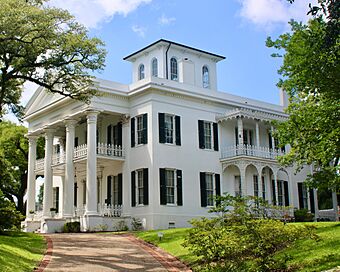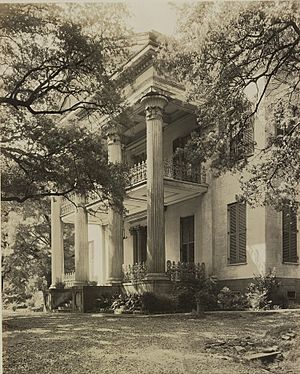Stanton Hall facts for kids
|
Stanton Hall
|
|

Stanton Hall in 2024
|
|
| Location | 401 High Street, Natchez, Mississippi |
|---|---|
| Built | 1851 |
| Built by | Thomas Rose |
| Architectural style | Greek Revival |
| NRHP reference No. | 74002254 |
Quick facts for kids Significant dates |
|
| Added to NRHP | May 30, 1974 |
| Designated NHL | May 30, 1974 |
Stanton Hall, also known as Belfast, is a huge, beautiful house in Natchez, Mississippi. It was built in the 1850s. This amazing home is a great example of Greek Revival architecture. This style looks like ancient Greek temples.
Stanton Hall is one of the most fancy and grand houses built before the American Civil War. It is located in the southeastern United States. Today, it is a historic house museum. This means you can visit it to learn about its history. The Pilgrimage Garden Club takes care of it. The house was named a National Historic Landmark in 1974. It also became a Mississippi Landmark in 1995.
Contents
What Does Stanton Hall Look Like?
Stanton Hall is very big! It takes up a whole city block in Natchez. This block is about 2 acres (0.8 hectares) in size. A pretty iron fence surrounds the property. The house itself is made of brick. It is covered in white plaster, making it look bright and grand.
The Design of Stanton Hall
A local builder named Thomas Rose designed and built the house. He was an immigrant from England. The front of the house has a tall, two-story porch. This porch looks like a Greek temple. It has four large, round columns. These columns are made of cast iron and have fancy tops. They hold up the roof of the porch.
Between the columns, there are decorative iron railings. These railings are also on a second-floor balcony. The main roof of the house is sloped. It has a large, small dome called a cupola in the middle. Inside, Stanton Hall is very fancy. It has beautiful materials like marble from Italy. There are also fabrics from Paris and chandeliers made of glass and bronze.
The History of Stanton Hall
Stanton Hall was built between 1851 and 1857. It was built for a man named Frederick Stanton. He was a very successful cotton broker. This means he bought and sold a lot of cotton. Mr. Stanton named his new home "Belfast."
Sadly, Frederick Stanton only lived in the house for nine months. He passed away from yellow fever. The house was so big and fancy that it was very expensive. It became a big financial challenge for his family after he died. However, the house survived the American Civil War.
In 1890, Stanton Hall became a school. It was called the Stanton College for Young Ladies. In 1940, the Pilgrimage Garden Club bought the house. They still use it as their main office today. They also run it as a museum. People can visit to see the beautiful house and learn about its past. It is also used for special events.
See also
 In Spanish: Stanton Hall para niños
In Spanish: Stanton Hall para niños
 | Tommie Smith |
 | Simone Manuel |
 | Shani Davis |
 | Simone Biles |
 | Alice Coachman |




